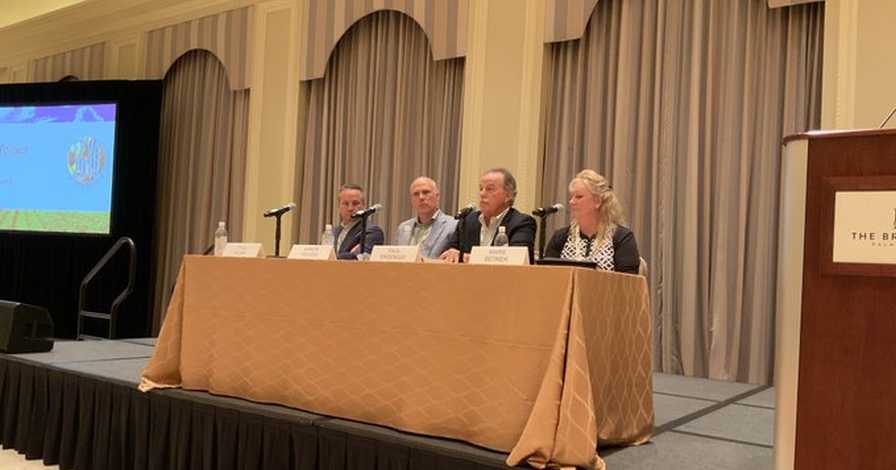Florida Farmers Show Why They Are Leaders in the Field

Several of Florida’s agricultural leaders took the stage during FFVA’s 76th Annual Convention to share insight on what it takes to lead by example. Photo by Frank Giles
Volunteer fresh ideas, bring out the best in others, and don’t be afraid to ask for help. Those practical tips and insights to help the next generation of agricultural leaders find success were part of a wide-ranging panel discussion at the Leadership Forum during FFVA’s 76th annual convention.
John Hall, Manager of Leadership Development for Farm Credit of Florida, moderated a panel for members of FFVA’s Emerging Leader Development Program and other convention attendees. The forum was a new addition to the convention lineup and was very well received.
Participating in the session were four FFVA board members: Paul Allen, R.C. Hatton Inc. and current board chair; Aaron Troyer, Troyer Brothers and vice chair; Paul Orsenigo, Orsenigo Farms and immediate past chair; and Marie Bedner, Bedner’s Farm Fresh Market and chair of FFVA’s Advocacy Committee.
FFVA President Mike Joyner opened the session by noting the importance of an early mentor in his career. “I was born in Wildwood, but I was raised in the office of my mentor, Carl Loop,” he said. “That’s what today’s session is all about, because there’s no better way to learn than from proven leaders.”
To kick off the discussion, Hall asked the panelists what leadership skills have helped them the most in their careers.
Surround Yourself with Talent
“Leadership is a behavior, not a position,” Bedner explained. “You have to show those behaviors to your team and be able to keep going, even when you run into challenges.”
Orsenigo said there are many aspects to running a business, but a successful leader stays focused on “keeping the main thing the main thing” rather than being distracted. Finding talented workers is another important skill. He emphasized the “ability to recognize ability” as key in building your organization.
Troyer agreed on the importance of staying on track and maintaining a positive attitude. “Surround yourself with really good people, encourage them to bring their own ideas to the table, and let them run,” he said.
Allen said the advice he received from his mother — “Everyone has good and bad points, so focus on the good” — has carried him a long way in life. “It’s also important to look in the mirror and see your own weak points and how you can better yourself. My other piece of advice is to be around successful people and see how to apply their practices to your own business.”
Hall asked the panelists what steps they had taken to develop their professional skills. The responses included developing public speaking skills, reading leadership-focused books, and taking the time for spiritual growth. “We should all be lifelong learners,” Orsenigo said.
Noting that millennials are changing the agricultural workplace, Hall asked how the older generation of leaders is responding. “Our generation just works and works, but the younger generation appreciates their social time,” said Allen. “You know what? They got it right. We shouldn’t have to work six and seven days a week.”
Bedner said her business employs all ages of workers, from high school students to retirees. “We bring them together and offer flexible work schedules,” she said. “It’s a nice blending of skills and attitudes. Certainly, the young members of our team help us keep up with technology, which is a very positive thing.”
Orsenigo said he had open conversations with his son, Derek, with whom he farms, about the future and being patient with each other as they work together. “We laugh about it now, but it was important for our relationship at the time,” he said.
Public Outreach
Hall noted that great leaders influence others to make the right choices and asked for tips on educating the public about farming. “We believe in education, information, and transparency,” said Bedner. “We like to answer [the public’s] questions, because an open dialogue is great.”
Troyer pointed out the benefits of responding to consumer tastes and preferences, such as changing packaging from plastic to paper. Product labels also are a good way communicate with consumers, he added.
Finally, Hall asked about how to keep agricultural businesses on track in a challenging environment. “We believe you need to have a moral compass and stay on track with your principles,” Bedner said.
Allen emphasized the importance of “servant leadership,” showing workers that you care about them. Troyer agreed, adding, “Say hello to the person driving the tractor in the field. It seems like a little thing, but it goes a long way in showing that you care about your people.”









